 Important Note: If you’re dead serious about becoming a Private Military Contractor, then you NEED to check out our new 106-page eBook here.
Important Note: If you’re dead serious about becoming a Private Military Contractor, then you NEED to check out our new 106-page eBook here.
It details literally everything you need to know about becoming a PMC, and will boost your chances of landing a job dramatically.
All important aspects are discussed, including:
- The risks, benefits, and day-to-day life
- How to find the best and most lucrative PMC companies
- How to craft your resume
- Acing the interview
- What to bring when you deploy
- and much more…
Click Here to learn more.
Private Military Contracting, in general, has gotten a pretty bad rap over the years.
They often get labeled as “mercenaries,” however, that is not always the most appropriate or accurate description.
As a matter of fact, I personally wouldn’t call it an accurate description at all.
In fact, there are a lot of military contracting jobs that don’t involve carrying a gun… at all.
Related Article: The Ultimate Guide to Becoming a Private Military Contractor
Some of the most well-known companies that employ private military contractors include:
- ACADEMI (formerly known as Black Water)
- G4S
- FDG Corp
- MRPI
- Northbridge Services Group
- Aegis Defense Service
- Triple Canopy
There are literally dozens of others, but those are the bigger, more well-known ones.
These companies operate both domestically and overseas, often in hot spots like Afghanistan, Africa, and even Europe.
While a good chunk of these companies requires previous military experience, many require no experience at all.
In this article, we will examine the most common private military contractor jobs, as well as explore some less popular roles that are available to citizens without military experience.
Note: The images below are for illustrative purposes ONLY. These are not actual private military contractors, as finding images of PMCs is about as easy as patching through to the White House!
Related Article – How To Land The Highest Paying Jobs In The Military
Jump To A Job
| Common PMC Jobs | Un-Common PMC Jobs |
|---|---|
| #9: Static Security #8: Roving Security #7: Security Management #6: Personal Security Detail #5: Private Investigations #4: Medic #3: IT / Network #2: Logistics #1: Training | #3: Maritime Security #2: Designated Defensive Marksman | Sniper #1: Explosive Dog Handler |
#9 – Static Security
By definition, static security essentially means providing security in a fixed position or location.
When you think “static security,” think of a guy manning a tower.
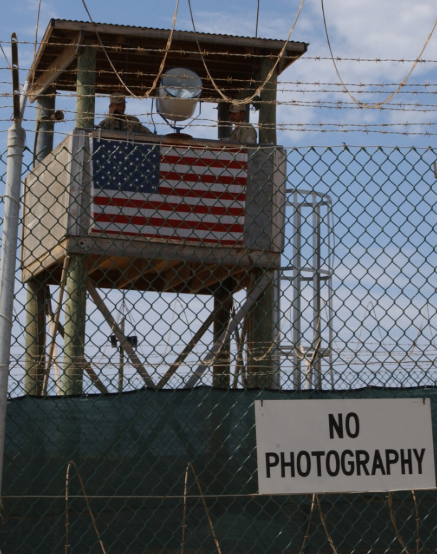
The term static security is a little misleading, at least in the context of private military contracting.
It does entail fixed position security, however, in some cases, it is actually done in patrols, not just in a stationary position.
Static security is really important to the U.S. government. It helps ensure that important people and vital infrastructure are guarded at all times.
Related Article – 5 Types Of Military Discharge
These can include things like:
- Dams and bridges
- Airfields / Airports
- Prisons / Jails
- Power plants
- Oil rigs
- Construction sites
- Maritime Security (i.e. ships)
Private military contractors that work static security are assigned by the Department of Defense to patrol places of high importance and value, often in conflict zones.
Even though most patrols go without conflict, there is always the potential for something dangerous to occur.
Especially when in combat zones.
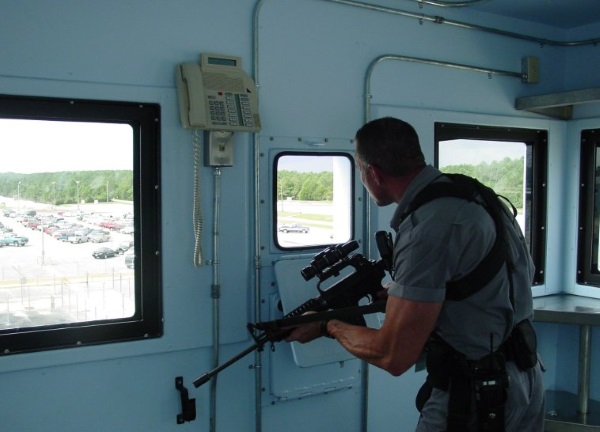
Therefore, those that work static security must remain very disciplined, organized, observant, and well-trained to handle a variety of potential situations.
Static security is put in place to prevent bad guys from f#$king things up, not to capture them.
When a static security shift is effective at their job, it goes without incident.
In short, the patrol managed to thwart any crime.
Related Article – Air Force Security Forces (3P0X1): Career Details
It can be a very boring, tiresome job, but the pay can make it worth the boredom.
According to a report by CNN, the U.S. government is willing to pay quite a bit for static security.
#8 – Roving Security
Roving security is comparable to static security with the exception that some guards may have some type of transportation, like a vehicle, to patrol a larger area.

The objective of roving security is similar to the duties of static security.
While guards are prepared to handle combat, a vast majority of their time on the clock is intended to prevent attacks.
When there is a visible security presence, terrorists, enemies of the state, and bad guys may think twice about going through with an attack.
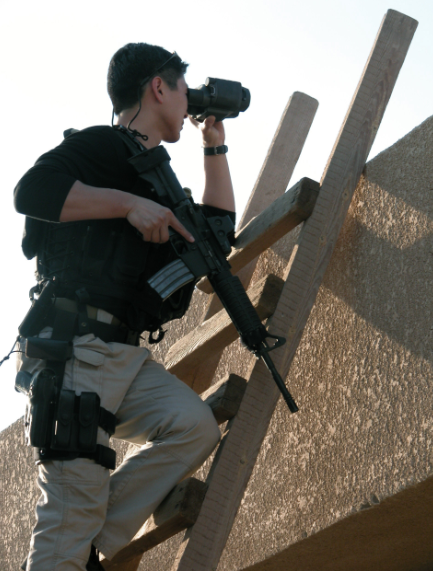
Therefore, the U.S. Military relies on independent contractors stationed at places where they may not want to use their own troops.
In addition to deterring crime, roving security can also serve as public information officers.
They can help make sure that basic rules around or inside the perimeter are adhered to.
Think of them as military police, without actually being in the military.

Furthermore, they can spot incidents before they even happen and be the ultimate watchdog for the security detail.
How much does a Roving Security Contractor make?
The salary and compensation can be all over the place depending on the company you work for, the location you work in, etc.
With that said, here are a few examples:
- High Threat Security Operator – $450 a day
- Personal Security Specialist – $600 – $650 a day
- Guard Site Supervisor – $800 a day
In general, roving and static security are some of the highest-paying private military contractor jobs on the planet.
#7 – Security Management
As you would expect with any management position, working as an independent contractor in security management offers more incentives like better pay and benefits
However, it also entails far more responsibility.
Security is a major role that private military contractors serve in the U.S. Military.
Once again U.S. Armed Forces branches do not always want to lower their troop count just to handle security.
It’s why private contractors are often tasked with important security detail.
If you get employed as a security manager, you will handle an entire operation. You will have other members that work under you and together as a team, you ensure the safety and security of an assigned location.
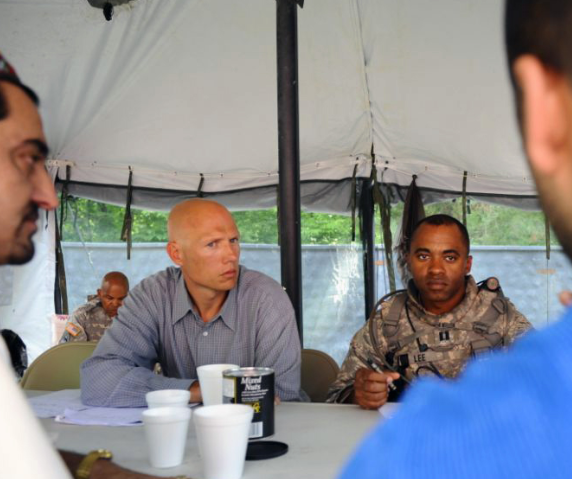
In addition to important infrastructure such as foreign embassies and military bases, you may also handle security for a specific individual.
Regardless, there is plenty of planning and organization required to handle your own security detail.
Managers are usually very knowledgeable and well-trained. They are natural leaders that are good at delegating and managing other contractors as well.
Related Article: DEVGRU (aka SEAL Team 6) – Everything You Need to Know
Security management contractors generally have a lot of experience working in the industry. The individual is capable of developing and implementing security policies, protocols, and numerous procedures.
There is also the need to manage a budget and make sure security expenses stay within reason. Additionally, managers need to recruit and train personnel. It is a supervisor role, so managers are consistently monitoring performance and how security can be improved.
How Much Do Security Management Personnel Make?
While it is difficult to get a precise figure on what you can expect to receive in terms of earnings as a security manager because of the secretive nature of private military contracting work – expect higher paying salaries due to the more important roles.
According to several sources, private military contractors can earn between $80,000 to $250,000 per year.
So it is not out of the question that security management for the right company could earn you six figures a year.
Keep in mind that many of these jobs can be as short as one month to as long as several years.
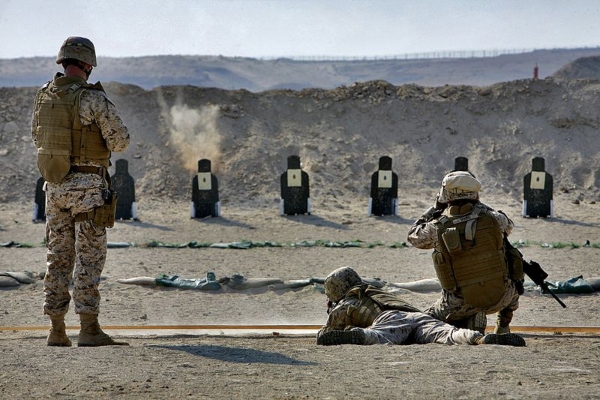
#6 – Personal Security Detail (PSD)
Personal security detail, or PSD, is an important role that many different independent contractors serve for the Department of Defense and other private organizations.

PSD is short for protective services detail. It is also sometimes referred to as “personal security detachment” or “personal security detail.”
The biggest difference between static or roving security and PSD assignments is that PSD personnel are in charge of an individual or group of people.
Protective service detail involves better organization and planning compared to static and roving security because the detail is not stationary.

Therefore, personal security detail must adapt to a variety of different environments, some of them very complicated and crowded.
Private Security Detail assignments may include high-profile people, some of which have a massive target on their backs.
The personal security detail could include just you or a team of security organized to protect the individual or group.

Security teams can represent a combination of military personnel, private security contractors, and law enforcement.
One aspect of PSD work that is attractive for independent contractors is that they can work at home or abroad.
Unlike most private military contractor assignments, PSDs are hired for domestic as well as international work. So it is possible to live at home or close to home, while on assignment.
Note that I said “possible”….this, of course, isn’t always the case (and most of the time isn’t).
There are other PSD jobs that require international travel and exist primarily, or exclusively abroad.
ACADEMI, DynCorp, and Triple Canopy Inc. are three different organizations known to employ private military contractors for personal security detail.

Private security detail applicants are scrutinized heavily. Companies look for very decorated individuals with a lot of experience. It helps to be former military, yet that’s not a necessity.
There are plenty of military contractors doing PSD work that were former police, for example.
PSDs that are experienced working in stressful or dangerous situations are preferred. Your background will also be assessed thoroughly. PSDs are not considered with a criminal record or other red flags.
How Much Does PSD Work Pay?
Like most of the other private military contracting jobs on this page, the pay varies based on experience and the individual job.
A typical executive protection job will be anywhere from $450 – $800 a day, including benefits and paid training.
#5 – Private Investigations
Private investigations may not quite represent the nosy PIs that are depicted on TV screens, however, there is some truth to how freelance operatives can gather intelligence for a private client.

In the case of the U.S. federal government, it is possible to receive work as a private investigator gathering important information regarding matters of national interest.
There are actually a variety of ways that private investigators can earn a living through the U.S. Military. In addition to gathering intel, they may also work technical surveillance counter-measures.
Since PIs for the military work some fairly secretive operationsk there is not a lot known about this position regarding specifics. However, it is a way you can earn money working for the federal government privately.
Related Article – CIA Special Activities Division – Inside SAD
#4 – Medic
People rarely connect the two subjects, however, becoming a professional medic actually has a lot of purpose if you ever plan to become a private military contractor.
Why? Medical qualifications give you a leg up on the competition for military contract jobs because of the dangerous predicaments and how those skills can be useful in combat situations.

In fact, oftentimes private military contractors are not hired for their marksmanship skills, but rather their survival skills.
Therefore having the ability to patch up wounds, deal with medications, and other skills of a medic is very practical.
Medics help save lives and these skills are very desirable in the field of private military contracting.
As a valuable asset of the military, you can work as a paramedic, nurse, or doctor.
How Much Do Medics Make?
Though the medical profession generally pays well for starters, you can potentially make nearly double of a typical salary back in the States with the right qualifications and experience.
It is especially true if there is a strong demand for medics at the moment due to a shortage.
The government will pay handsomely in order to reward you for working in conflict zones and places of high stress.
Related Article – National Guard Military Police (MOS 31b): Career Details
#3 – IT / Network
In addition to working as a medic, there are other PMC jobs that do not require you carry a firearm or have much advanced training in terms of being prepared for combat.
While you may still work in potentially dangerous situations, the vast majority of work that IT and network teams handle for the military is not all that risky.
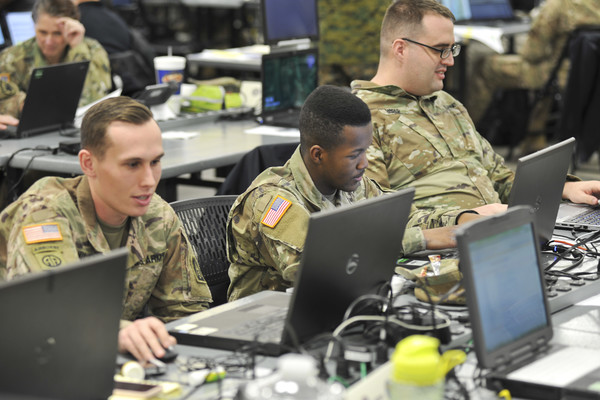
As the world becomes more technologically dependent, the operations of the U.S. Military are no different.
The military stills needs to hire people, generally independent contractors, to help keep their technological systems and networks up and running.
A skilled IT member can earn six figures working for the federal government. The military depends on the best IT technicians available because they can’t afford downtime.
Skilled IT professionals can quickly diagnose issues and make repairs to eliminate downtime.
The biggest drawback, like most private military contractor work, is that you may work in some remote places and in foreign places that are not the most comfortable or accommodating.
However, adventurers at heart will absolutely thrive in this kind of career path.
Related Article: 20 Reasons to Join the Military (and 7 reasons not to)
#2 – Logistics
Logistics is a very sophisticated term that can encompass a number of different jobs.
In relation to the U.S. military and private contract work, it can include everything from coordinating people, facility management, or management of supplies.
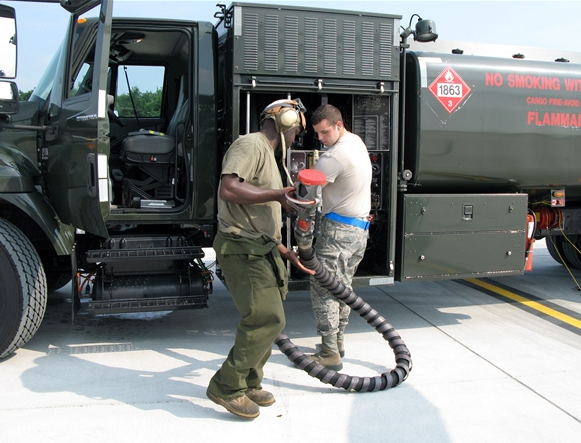
It can also resemble the movement and transportation of goods or people. In military settings, there is plenty to organize from troops to their supplies to their equipment and weapons.
Members of the military also need to get well-fed, clothed, and transported in mass quantities. It can also include building maintenance and other construction or labor jobs.
#1 – Training
Anyone that has ever served in the U.S. Military can attest to the variety and comprehensive levels of training they receive.
There is always a need for experienced instructors and other experts in a certain niche to offer their services.
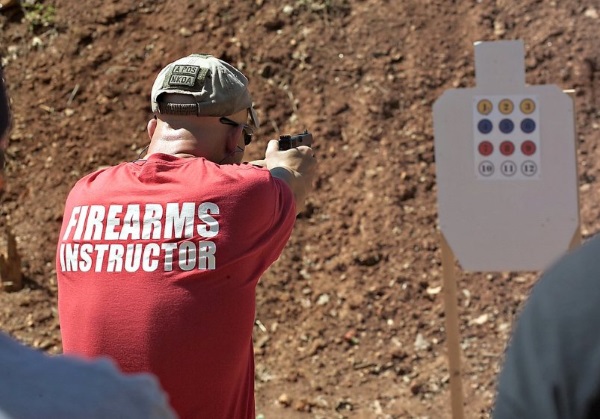
If you have a specialized skill or have become what some would define as an expert in a certain type of combat, you could get hired by the U.S. Military to train recruits or veteran soldiers.
Training something you already know well is also beneficial to your pockets as instructors can earn some serious cash for dishing out their knowledge.
3 Uncommon Private Military Contractor Jobs
Now that you know the 9 best ways to get a private contract job working for the U.S. Armed Forces or federal government, let’s examine a few of the lesser-known professions:
Related Article – Delta Force – Everything You Need to Know
#3 – Maritime Security
Maritime security is a broad term for security that has to do with the sea.
It is often broken down into four other categories known as national security, marine environments, economic development, and human security.
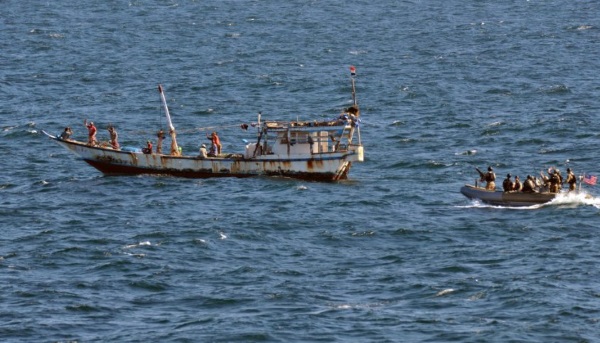
This vital position is responsible for protecting ships that pass through areas like the Gulf of Aden.
Once known as one of the most dangerous areas in the world to pass through, the addition of Maritime security contractors on ships has all but effectively stopped ship hijackings.
Like other security jobs, the compensation is lucrative, with the average compensation starting at $700 a day.
#2 – Designated Defensive Marksman | Sniper
It is important to remember that private military contractors are first and foremost trained to handle potential conflict yet not pursue it as a first line of combat.
Most private military contractor jobs are security types that are a form of preventive defense, not roles that approach direct attack and initiate it.
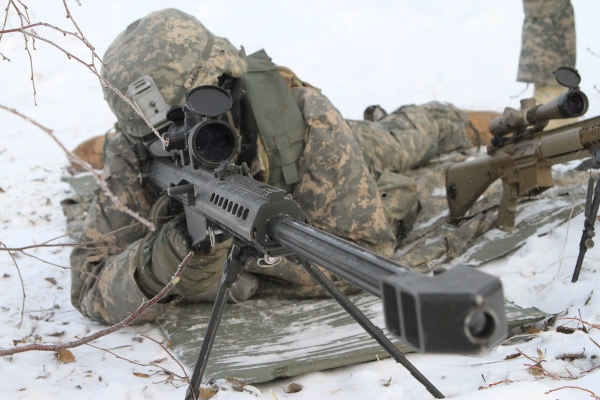
However, designated defensive marksmen are one example of a private military contractor role where the contractor is prepared to handle serious resistance.
There are some serious marksman qualifications and certifications you must meet because it is the role of a sniper, yet part of the role is also providing advanced security.
Designated defensive marksmen are capable of providing quick backup support in the event things go south though they are not sent in as a first line of attack. Once again it remains more of a defensive position, hence the job title.
#1 – Explosive Detection Dog Handler
Dogs have saved countless lives as they’ve grown to have a more significant role in the U.S. Military.
Dogs, like explosive detection experts, can help uncover dangerous explosive devices and other weapons of warfare before other personnel pass through the area.

Every service dog in the U.S. Military needs its own handler.
The handler is responsible for the well-trained animal. In addition to keeping them trained to handle the most recent weapons, they also look after every other aspect of their welfare.
Canine handlers in the military usually need to have several years of experience and many different levels of certification in order to get considered as a PMC.
If you do land a rare job working as a handler, it is an incredibly important job that can help save many lives.
Frequently Asked Questions
The below questions are some of the more common ones we get surrounding private military contractor jobs.
If you have a specific question (or questions) that aren’t addressed below, feel free to scroll down and leave a comment.
What types of jobs are available through private military contractors?
Most jobs through private military contractors are security positions. These include static security, roving security, personal security, and security management.
What is the biggest private military company?
Some of the biggest private military contracting companies include ACADEMI (once known as Black Water), G4S, FDG Corp., DynCorp, MRPI, Aegis Defence Service, Erinys International, and Northbridge Services Group.
How much do private military contractors pay?
Pay for static security can range from $500 to $750 per day. Roving security personnel can make from $450 to $800 per day. Management positions can pay between $80,000 to $250,000 per day.
Can you be a private contractor without military experience?
It helps to be former military but it’s not always a requirement. Many private contract security personnel are former police officers.
Does the military hire private contractors for cyber security?
The U.S. military frequently hires security analysts and operators to provide cyber security for sensitive computer systems. However, rather than going through large companies, they tend to hire individuals on an as-needed basis.
Conclusion

There are a variety of different ways you can earn a living working for the military as a private contractor. PMCs work hard, and often in dangerous situations, yet earn handsome compensation in response.
Not everyone qualifies to get considered for private military contract work.
However, if you think you have what it takes, contact the Department of Defense of a private company that hires PMCs for more information.
Related Article – 20 Best Jobs For Veterans
References
https://www.thejournal.ie/piracy-somalia-down-on-last-year-1219326-Dec2013/
https://www.academi.com/pages/careers
- Top 13 Private Military Companies - June 17, 2024
- 9 Common Private Military Contractor Jobs - June 17, 2024
- The Ultimate Guide To Becoming A Private Military Contractor - June 17, 2024
Originally posted on June 12, 2019 @ 2:55 am
Affiliate Disclosure: This post may contain affiliate links. If you click and purchase, I may receive a small commission at no extra cost to you. I only recommend products I have personally vetted. Learn more.



